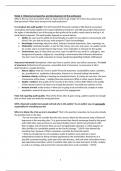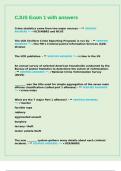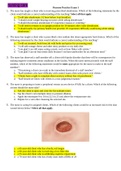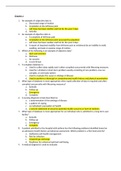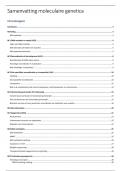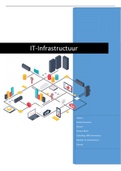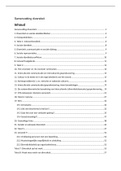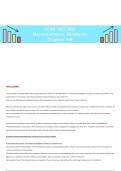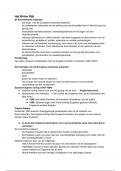What is the use of an accountant when so much seems to go wrong? Or is there less going wrong
than perceived? What went wrong in the audit profession?
It is all about the audit quality! The AFM (autoriteit financiele markten), NBA (Dutch accountant
association), EUmedion (platform for large institutional investors), and VEB (association that protect
the rights of shareholders) are all focusing on the quality of the audits, mostly done by the big 4, of
stock listed companies. The audit quality depends on several factors:
Ability; do you have the ability to do technically an audit? Are you able to communicate with
clients? Are you able to do your work properly? (close to knowledge)
Knowledge; knowledge about the client, industry, financial statements, laws, reporting, etc.
Motivation; motivated auditor, or just for the money, nice suit, and career. An auditor works
for society and is not interested in big money. Your motivation is relevant for the quality
Environment; type of client that you serve, type of audit firm you work for, colleagues, own
background of parents, religion etc. everything in environment that influences behaviour.
You don’t want to audit companies in money laundering (gambling football, child labour)
Assurance framework (Humphrey): when you have to audit a client, you deliver assurance. The level
of assurance (limited level of assurance, reasonable level of assurance, no assurance at all) is
determined by a couple elements:
o Nature object; what do I have to audit? Financial statement, sustainability report, subsidies,
etc. quantitative vs. qualitative information, historical vs. forward looking information
o Hardness criteria; auditing is checking on standards/criteria. If criteria are not clear, the level
of assurance will be lower > auditing financial statements (IFRS) or other reports (harder)
o Quality evidence; the quality of the records of the client; is there SOD? What is the quality
of the internal control? do they have enough documents? You build your opinion on this
o Amount of work; make choices in what you’re going to do and what not; sample or entire
population, amount of hours of work you put in the engagement
Main risk regarding audit quality; Most of the times when it goes wrong, auditors spend not enough
time on their audit and make the wrong decisions.
With a financial scandal most people will ask who is the auditor? As an auditor you are personally
responsible for everything you do!
Who is to blame the crisis we are in nowadays? That is the question nowadays, but was also already
the question back in the days
- ‘’For our own part we consider that the class most to blame for the present state of financial
depression is the investing class. To a great extent they directly encourage fraud by the greed
with which they snap up shares in any impracticable concern which may pretend to offer
them a higher rate of interest than can ever be legitimately expected, or which appears to
offer facilities for a profitable gamble on the Stock Exchange.’’ (1894); they blamed the
investing class, because of them companies overstate the financial reports
- ‘’I think we should hear less of scandalous audits if auditors were placed in a more
independent position by being veritably appointed by the shareholders themselves at a
specially convened meeting, quite apart from the directors, and took their instructions from a
duly appointed committee, whom it would be their place to meet and report to fully, verbally
as well as in writing, and receive their remuneration from such committee.’’ (1894)
1
, After these years they changed that the supervisory board needs to appoint the auditor, instead of
the director/board of management of the company. The board of management is part of the object
of the audit, so they shouldn’t appoint the auditor, in order for the auditor to stay independent.
Recurring issues (since 1875)
* Fraud responsibility; who is responsible? The auditor? First the individual itself is responsible
for committing fraud, followed by the company. The auditor has to detect internal control
breaches, and so discover fraud
* Is the auditor a valuator?; do you know enough about valuation? Experts need to determine
a proper valuation since the auditor is no valuator
* Expectation gap; society is expecting an auditor audits everything in the financial statement,
but the auditor uses materiality and is not auditing everything because that will take time
o Are auditors able to audit sustainability information?
* Ethical issues; different ethical perspectives (week 2)
* Ambiguous legislation; legislation is not always clear, is it principle based or rules based?
* Interpretation of reporting rules; IFRS looks rules based, but it is impossible to find one rule
that everyone understands and interpret in the same way
* Unconscious bias; (Paper Bazerman) you are doing a lot of things that you are not aware off.
It is very difficult to be independent; try to be independent, objective, integer. Things we
think nowadays are completely fine, might seem wrong in 10 years
Solutions of the issues:
Regulations; when the audit profession started, there were no laws at all. It was just the
market that asked for an independent specialist that would audit the financial statement. To
check on the deeds of the auditors, regulations, standards, and uniform criteria came in
Professional associations; like NBA, were founded to organize all kind of quality reviews;
checking on the quality of the files of the audit
(external) Oversight bodies (AFM) and international cooperation’s; the NBA is part of the
European association Accountancy Europe, Accountancy Europe is part of the international
global organization IFAAC. Standards of auditing are internationally everywhere the same
Codes of conduct; how you should behave (objective, professional, integer, etc.); check the
pledge on an exam, from that moment you will never do any fraud during the exam. Auditors
wont fraud; the audit profession is all about trust
In most papers they make a distinction between the big 4 (Deloitte, KPMG, EY, PwC) and the other
audit companies. Somehow the big 4 claims that they are better, and there is a lot of research
approving it; there is more quality because of the lots of resources to create uniform quality systems,
and they have more money to hire experts. But when something goes wrong it’s also with the big 4,
just because most of the stock listed companies are audited by one of those 4.
Bazerman Mueller Humphrey
Not effective More rules Deny the problem (attack) An audit is an audit
Disclose conflicts of interest More rules and legislation Deny the problem
Stricter accounting standards Checking the boxes
Effective No combination of services Recognizing the problem Not only assurance
Fixed fees (+ fixed period) Visible action for improving Improve quality of information
No rehiring (client rotation) More than just assurance Non-financial information
No job hopping Story behind the information
Ethics in education Sustainable development goals
2
,There is a growing number of companies that might find difficulties in finding an auditor, because
they’ve been negatively in the news related to unethical behaviour/fraud; auditors don’t want them!
3
, Bazerman, M.H., Lowenstein, G., & Moore, D.A. (2002); Why good accountants do bad audits
Sarbanes-Oxley Act (2002): corporate accountability as response to financial scandals that begun to
undermine citizens’ confidence in business. The Act creates a regulatory board with board power to
punish corruption, monitoring accounting firms, and establishing stiff criminal for accounting fraud
Places new legal constraints on executives
Gives expanded protection to whistle-blowers
Puts accounting industry under tightened federal oversight (no consulting)
It’s not a matter of corruption or criminality why it went wrong; auditors are not unethical! The more
pernicious problem with corporate auditing is its vulnerability to unconscious bias
Bias: our desires powerfully influence the way we interpret information, even when we’re trying to
be objective and impartial. When we are motivated to reach a particular conclusion, we usually do.
Self-serving bias: armed with the same information, different people reach different
conclusions – one favors their own interests
Unconscious bias is why good accountants do bad audits, because you are not aware of some
behaviour. There are several facts of human beings that lead to unconscious bias;
Subjective nature of accounting; accounts in the balance sheet are valuated subjectively. It’s
a matter of agreement of how things are valuated and timed, not all countries agree on every
account in balance sheet and disclosures in the financial statements > Interpretation
Tight relationship; it’s wrong when the client becomes your friend, but we are still human
beings. So there will always be some kind of relationship between the auditor and the client;
some people you like, others you don’t. Auditing people you don’t like is more easier
Desires; when you want a certain outcome from calculations, scenarios or analysis, it’s really
difficult to find that the outcome is not the desired outcome
Unconscious bias; there are 6 issues/elements of things that you are not aware of
Structural aspects of accounting; three substantial opportunities for bias
o Ambiguity; interpreting reporting standards and information different; valuation
o Attachment; you should build a relationship with the client that influences your
decision making and opinion. Auditors are hired and fired by the company, de
individual auditors’ job may depend on success with a specific client
o Approval; looking for a outcome, especially when the company already made the
calculations and scenarios for certain outcomes > it’s difficult to have another
opinion. If you do the calculations yourself, the outcomes might be different
Aspects of human nature; three aspects of human nature that amplify unconscious biases
o Familiarity; more attachment; the client becomes your friend. People are more
willing to harm strangers than individuals they know, especially when those are
paying clients with whom they have ongoing relationships.
o Discounting; ignore problems from today and move them to the future; talk and
think about it later. You think it’s not relevant now, but it might be; time don’t solve.
People tend to be far more responsive to immediate consequences than delayed
ones, especially when the delayed outcomes are uncertain
o Escalation; things can be really small, but a large amount of small things can be huge.
The sum of small judgements may become large over time > long-standing bias
Unconscious bias may evolve into conscious corruption
Once participants interpreted information in a biased way, they are unable to undo the bias later!
People who never intend to do something wrong end up finding themselves in situations where they
are almost forced to continue to commit fraud once they have started doing this
4

